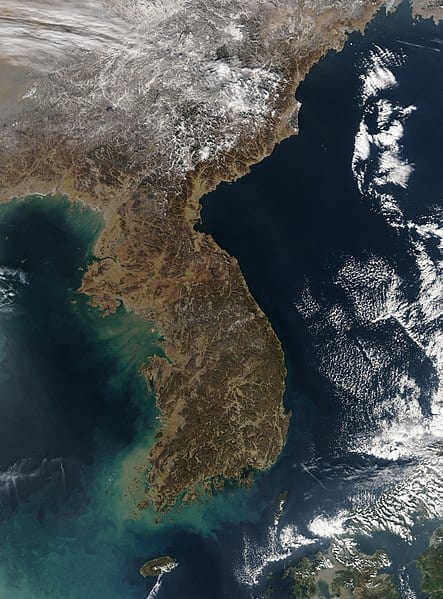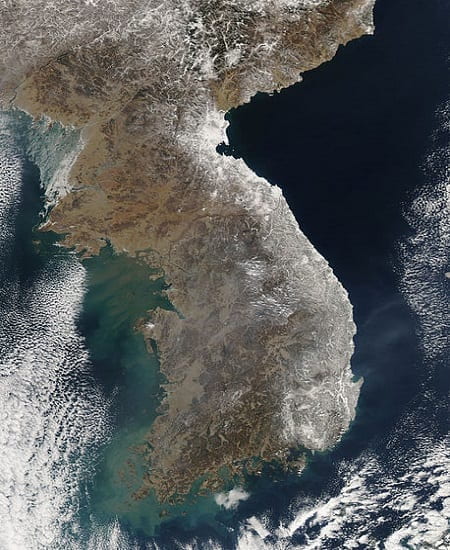7/5/18: Viewpoint on Security and North Korea’s Nuclear Program

Visiting Scholar’s Viewpoint on Security and North Korea’s Nuclear Program
By Tanvi Banerjee, Research Assistant, Rising Powers Initiative and Major Joon-hyouck Choi, ROK Army
On June 12, 2018, North Korea and the United States held a historic summit in Singapore. The Trump – Kim summit provoked mixed reactions from observers all around the world, including South Korea. Major Joon-hyouck Choi from the Republic of Korea Army – and a recent visiting scholar at the George Washington University’s Sigur Center for Asian Studies – remains skeptical of the summit’s outcomes. Furthermore, he cautions the United States and South Korea against eschewing preparations for the worst-case scenario given the highly volatile situation on the Korean Peninsula, and the international community’s inability to deter North Korea’s nuclear program in the past.
Major Choi argues that even though North Korea has found a way to the the dialogue table to negotiate about its nuclear program, the program is still very important to the North Korean regime. The North Korean leadership believes that with a sophisticated nuclear and missile program, North Korea will be able to: first, deter an American military intervention on the peninsula; second, attack the American mainland and U.S. allies during times of war; and third, ensure the survival of not only the state but also the current regime. According to Major Choi, the North Korean leadership’s strong commitment to its nuclear program is one of the biggest factors that has made the resolution of the nuclear issue very difficult.
International efforts at denuclearizing North Korea have also been relatively ineffective. Pointing to the example of international sanctions against North Korea, Major Choi explained that although sanctions did cause substantial economic damage to North Korea, the efficacy of the sanctions was reduced by several factors. These factors include mistaken perceptions about North Korea’s threat and its durability, and domestic and foreign policy options. According to Major Choi, North Korea’s neighboring countries also had a role in undermining the efficiency of international sanctions. China, in particular, has often bypassed U.S.-led sanctions efforts on Pyongyang.
However, Major Choi believes that sanctions alone cannot bring stability to the Korean Peninsula. Thus, South Korea cannot solely rely on relaxed perceptions about the threat posed by North Korea. Major Choi observed that South Korea’s previous policies towards North Korea underestimated the North’s motives, and its willingness to develop nuclear weapons. As such, Major Choi recommends that in order to address the North Korean nuclear threat, South Korea needs to move away from conventional countermeasures and create a more realistic response strategy.
Major Choi proposed that South Korea and the United States should instead reinforce their response strategy by adopting an offset strategy. An offset strategy refers to retaining a competitive advantage over adversaries to deter them while maintaining peace when possible. By adopting and enhancing their offset strategies against North Korea, the United States and South Korea, who have superior technical and military capabilities, will be able to leverage their asymmetric power against the North and create unacceptable costs for the North Korean state and its leadership in times of war.
According to Major Choi, lessons learned from the United States’ first and second offset strategy can be valuable in developing adequate response strategies against the North. The first American offset strategy included President Eisenhower’s New Look strategy, which intended to deter the Soviet-led Warsaw Pact by developing a formidable American nuclear arsenal in the 1950s. The second American offset strategy aimed to offset Soviet Union’s conventional military superiority in the 1970s. This strategy led to the enhancement of intelligence, surveillance, and reconnaissance (ISR) platforms, and the development of precision-guided munitions and technology such as the Global Positioning System (GPS). The United States was thus able to deter the Soviet Union without having to rely extensively on its nuclear arsenal.
Major Choi believes that conflict and cooperation are mutually coupled like two sides of a coin and that the situation on the Korean Peninsula can flip at any time. Additionally, North Korea’s nuclear and missile programs have become more sophisticated despite international efforts to stop the North’s nuclear program. According to Major Choi, to counter the North Korean challenge, the United States and South Korea need to strengthen the capabilities of the US-ROK Alliance. They need to enhance their respective conventional military capabilities and maintain an asymmetric advantage over North Korea.
Tanvi Ba nerjee is a senior in the Elliott School of International Affairs, majoring in International Affairs, with a double concentration in Asia and International Development. She is currently working as the International Affairs Research Assistant for the Rising Powers Initiative.
nerjee is a senior in the Elliott School of International Affairs, majoring in International Affairs, with a double concentration in Asia and International Development. She is currently working as the International Affairs Research Assistant for the Rising Powers Initiative.
MAJ(P) Joon-hyouck Choi was a Visiting Scholar at the Sigur Center for Asian Studies from January 2018 through June 2018. During his term at the Sigur Center, his research topic focused on history and applications of military strategy, and evaluating U.S.-ROK military posture vis-a-vis North Korea.


